北师大版高中英语必修二教案:unit5 辅导
- 格式:doc
- 大小:153.50 KB
- 文档页数:20
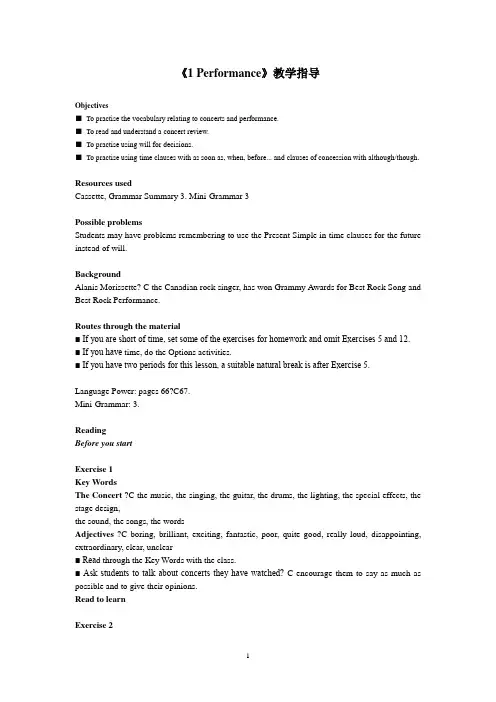
《1 Performance》教学指导Objectives■To practise the vocabulary relating to concerts and performance.■To read and understand a concert review.■To practise using will for decisions.■To practise using time clauses with as soon as, when, before... and clauses of concession with although/though.Resources usedCassette, Grammar Summary 3. Mini-Grammar 3Possible problemsStudents may have problems remembering to use the Present Simple in time clauses for the future instead of will.BackgroundAlanis Morissette? C the Canadian rock singer, has won Grammy Awards for Best Rock Song and Best Rock Performance.Routes through the material■ If you are short of time, set some of the exercises for homework and omit Exercises 5 and 12. ■ If you have time, do the Options activities.■ If you have two periods for this lesson, a suitable natural break is after Exercise 5.Language Power: pages 66?C67.Mini-Grammar: 3.ReadingBefore you startExercise 1Key WordsThe Concert ?C the music, the singing, the guitar, the drums, the lighting, the special effects, the stage design,the sound, the songs, the wordsAdjectives?C boring, brilliant, exciting, fantastic, poor, quite good, really loud, disappointing, extraordinary, clear, unclear■ Rea d through the Key Words with the class.■ Ask students to talk about concerts they have watched? C encourage them to say as much as possible and to give their opinions.Read to learnExercise 2■ Students read through the titles (a? Cd) and guess the order.Then they read the concert review and see if their guesses were correctAnswers1 d2 c3 b4 aExercise 3■Students can compare their answers in pairs before checking the answers as a class.Answers1 Yes, because it was the performance of a real star.2 They enjoyed it very much? C they loved the concert.3 The concert hall was cold and the sound was sometimes poor.4 Jagged Little Pill5 anger, love and joyExercise 4■ Students work in pairs, reading the text and finding the words. Answers1 audience2 album3 extremely4 throughout5 fan■ Ask students to look at the text again and to describe the songs “Everything But …” and “Heartache”.Exercise 5In groups, students discuss the possible reasons why pop music and rock ’n’ r oll are loved by many young people.Students also discuss which performers they would like to hear at a live concert and give reasons. Each group reports their discussion to the class. Have a class discussion if necessary.Language Power: the Word Corner on page 67 gives further practice of concert vocabulary.Grammar will FOR DECISIONS; ADERBIAL CLAUSES(I): TIME AND CONSESSIONExercise 6■ Students listen to the telephone conversation on the cassette to find out who decides to pick up the tickets. Play the cassette twice if necessary.AnswersSueTapescriptSue: Hello.Ricky: Hi, it's me. Are we still going to the concert on Saturday?Sue: Yeah, fine.Ricky: I'll pick up the tickets at lunchtime tomorrow. No … I can't.I've got choir practice. I know. I'll go and pick them up as soon asschool finishes.Sue: You can't tomorrow. It's early closing. The ticket office closes early.Ricky: You're right. Maybe my mum can get them. She works nearthe ticket office. I'll ask her when she gets back tonight.Sue: I've got a better idea, Ricky. I'll go and get them now, before Igo to the dentist …Ricky: Oh, all right … but I said …Sue: I have to rush, otherwise I won't have time. Byeee!Exercise 7■ Read through the sentences with th e students.■ Students then listen to the conversation again and note whosays the sentences.Answers1 Ricky2 Ricky3 Ricky4 Sue■ Play the cassette again, and ask:Why can't Ricky pick the tickets up at lunchtime tomorrow?(He's got choir practice.)Why can't he pick them up after school tomorrow?(The ticket office will be closed.)Where does Ricky's mum work? (Near the ticket office.)Where is Sue going after she's got the tickets?(To the dentist.)Exercise 8■ Play the cassette again and ask students to listen for which verb form Sue and Ricky use when they make sudden decisions. AnswerswillExercise 9■ In pairs, students read the sentence and decide what time the underlined part refers to? C the present or the future? Answersthe future■ Students then look back at the sentences in Exercise 7 and identify the linking words.Answersas soon as when beforeExercise 10■ Students read the sentences in pairs and underline the linking wordsAnswersalthoughExercise 11■ Students work in pairs, discussing what response to make in each situation.Suggested answers2 I’ll have something to eat in that cafe.3 I’ll buy some flowers for my friend.4 I’ll watch that concert tonight.5 I’ll answer it.6 I’ll see wh o it is.Exercise 12■ Students work in pairs and try to think of two different endings for each sentence.■ When checking answers, have several students give their answers for each sentence. The important point is that the verbs should be in the Present Simple tense.Suggested answers2 the lesson finishes3 you leave4 you pass your examination5 they are very busyLanguage in UseExercise 13■ Students ask and answer the questions, working in pairs.Go round to check that students are using the time and concession clauses correctly.OptionsPracticeStudents work in groups making chains starting with one of these sentences:When I can speak English fluently, I’ll …When I’m rich, I’ll …When I pass my driving test, I’ll …When I’m old enough, I’ll …The groups can then read out their chains to the rest of the class.ExtensionIf you or one of the students has a recording of AlanisMorissette, bring it into class and play one of the songs.Students can then discuss their reactio ns to the song, describing the singer’s voice and the effect it has on them.。
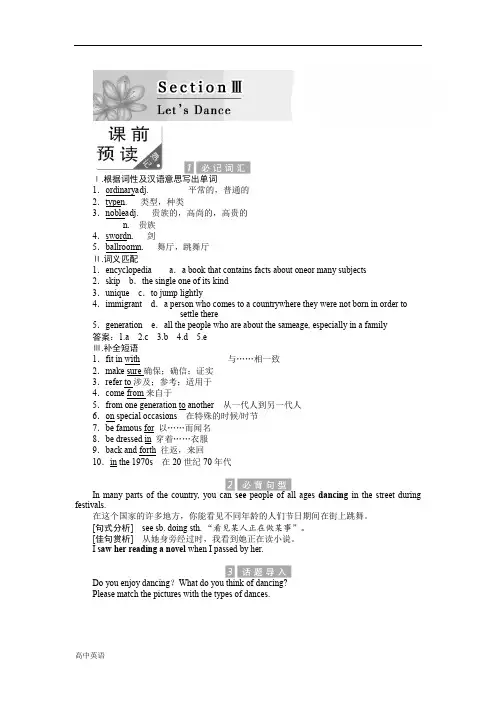
Ⅰ.根据词性及汉语意思写出单词1.ordinary adj. 平常的,普通的2.type n. 类型,种类3.noble adj. 贵族的,高尚的,高贵的n. 贵族4.sword n. 剑5.ballroom n. 舞厅,跳舞厅Ⅱ.词义匹配1.encyclopedia a.a book that contains facts about oneor many subjects2.skip b.the single one of its kind3.unique c.to jump lightly4.immigrant d.a person who comes to a countrywhere they were not born in order tosettle there5.generation e.all the people who are about the sameage, especially in a family答案:1.a 2.c 3.b 4.d 5.eⅢ.补全短语1.fit in with与……相一致2.make sure确保;确信;证实3.refer to涉及;参考;适用于4.come from来自于5.from one generation to another 从一代人到另一代人6.on special occasions 在特殊的时候/时节7.be famous for 以……而闻名8.be dressed in 穿着……衣服9.back and forth 往返,来回10.in the 1970s 在20世纪70年代In many parts of the country, you can see people of all ages dancing in the street during festivals.在这个国家的许多地方,你能看见不同年龄的人们节日期间在街上跳舞。
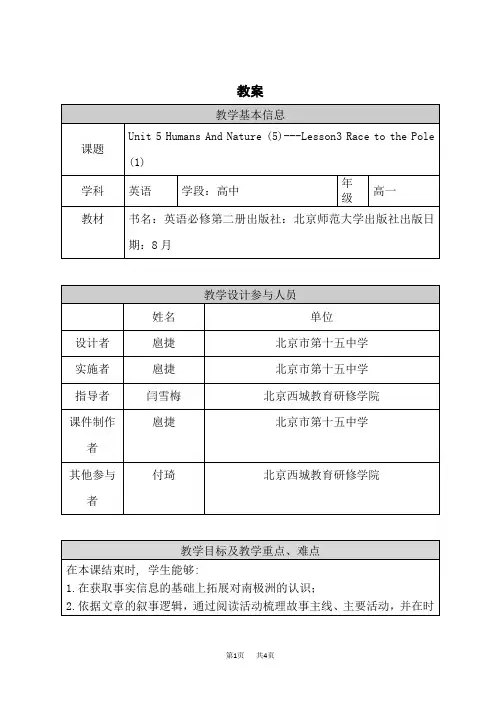
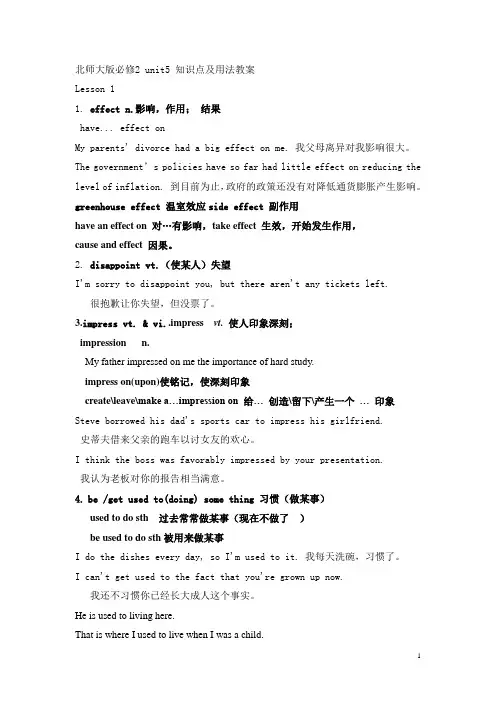

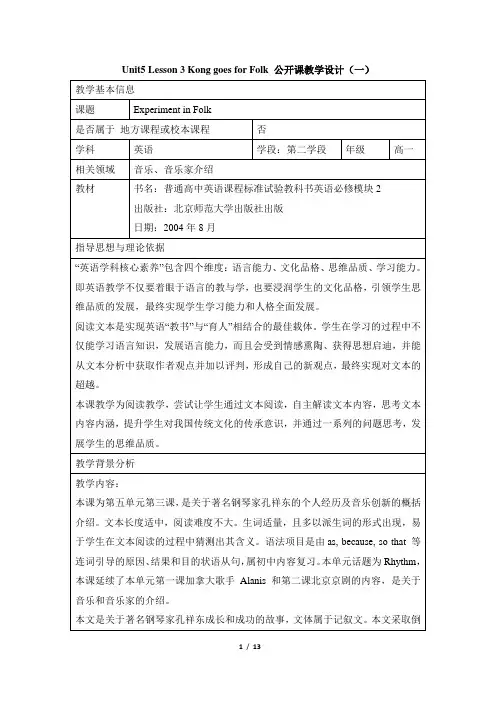
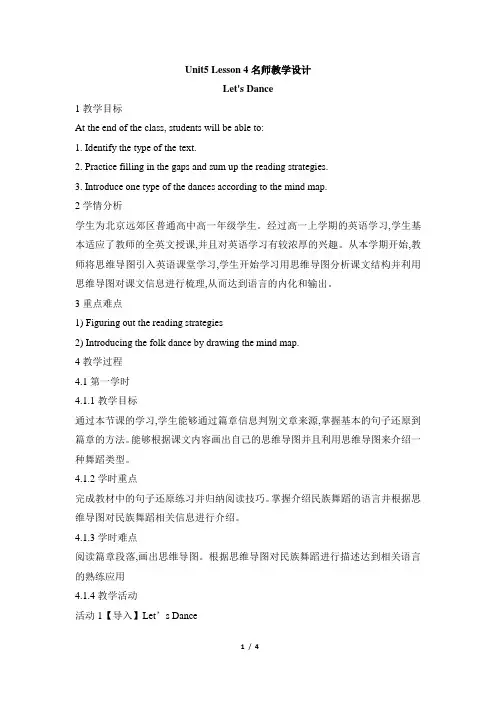
Unit5 Lesson 4名师教学设计Let's Dance1教学目标At the end of the class, students will be able to:1. Identify the type of the text.2. Practice filling in the gaps and sum up the reading strategies.3. Introduce one type of the dances according to the mind map.2学情分析学生为北京远郊区普通高中高一年级学生。
经过高一上学期的英语学习,学生基本适应了教师的全英文授课,并且对英语学习有较浓厚的兴趣。
从本学期开始,教师将思维导图引入英语课堂学习,学生开始学习用思维导图分析课文结构并利用思维导图对课文信息进行梳理,从而达到语言的内化和输出。
3重点难点1) Figuring out the reading strategies2) Introducing the folk dance by drawing the mind map.4教学过程4.1第一学时4.1.1教学目标通过本节课的学习,学生能够通过篇章信息判别文章来源,掌握基本的句子还原到篇章的方法。
能够根据课文内容画出自己的思维导图并且利用思维导图来介绍一种舞蹈类型。
4.1.2学时重点完成教材中的句子还原练习并归纳阅读技巧。
掌握介绍民族舞蹈的语言并根据思维导图对民族舞蹈相关信息进行介绍。
4.1.3学时难点阅读篇章段落,画出思维导图。
根据思维导图对民族舞蹈进行描述达到相关语言的熟练应用4.1.4教学活动活动1【导入】Let’s Dance播放我校艺术节活动中的三段舞蹈片段,引导学生欣赏并引入本课话题活动2【导入】学习目标介绍向学生介绍本节课的学习目标,是学生了解自己应该完成的任务和达到的能力活动3【活动】快速阅读1快速浏览课文发现课文来源,引导学生关注篇章内容外的信息。
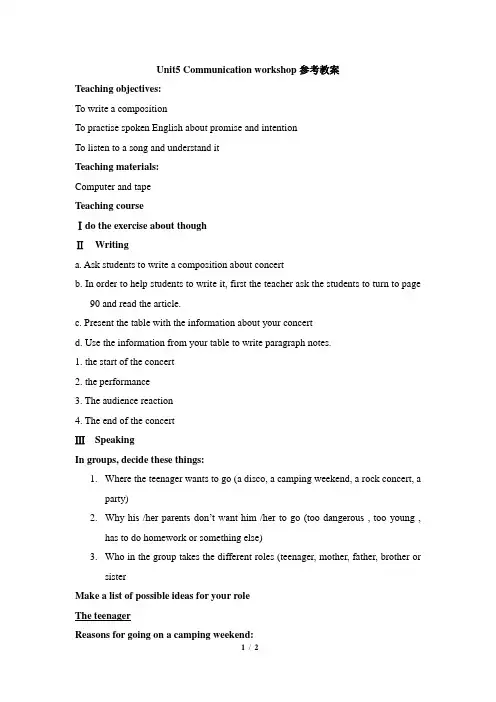
Unit5 Communication workshop参考教案Teaching objectives:To write a compositionTo practise spoken English about promise and intentionTo listen to a song and understand itTeaching materials:Computer and tapeTeaching courseⅠdo the exercise about thoughⅡWritinga. Ask students to write a composition about concertb. In order to help students to write it, first the teacher ask the students to turn to page90 and read the article.c. Present the table with the information about your concertd. Use the information from your table to write paragraph notes.1. the start of the concert2. the performance3. The audience reaction4. The end of the concertⅢSpeakingIn groups, decide these things:1.Where the teenager wants to go (a disco, a camping weekend, a rock concert, aparty)2.Why his /her parents don’t want him /her to go (too dangerous , too young ,has to do homework or something else)3.Who in the group takes the different roles (teenager, mother, father, brother orsisterMake a list of possible ideas for your roleThe teenagerReasons for going on a camping weekend:﹡have finished exams-got good marks﹡going to safe campsite with responsible friend﹡promised to help in house and garden laterHis /her parents don’t want him/her to go.The reasons:﹡going camping weekend is too tired, which makes you less energetic on Monday. ﹡it is too dangerous for children in field without adults’ protection.﹡you should finish the extra homework the teacher give you first.Work on your own. Make a dialogue with your partners.You can choose the topic you prefer.ⅣListeningPlay the cassette twice, the first time for general comprehension and then for students to fill in the missing wordsEncourage students to discuss answers to the three questions.。
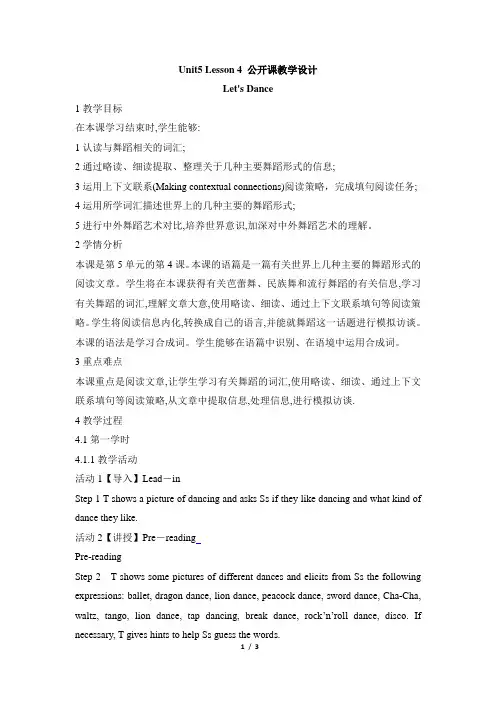
Unit5 Lesson 4 公开课教学设计Let's Dance1教学目标在本课学习结束时,学生能够:1认读与舞蹈相关的词汇;2通过略读、细读提取、整理关于几种主要舞蹈形式的信息;3运用上下文联系(Making contextual connections)阅读策略,完成填句阅读任务; 4运用所学词汇描述世界上的几种主要的舞蹈形式;5进行中外舞蹈艺术对比,培养世界意识,加深对中外舞蹈艺术的理解。
2学情分析本课是第5单元的第4课。
本课的语篇是一篇有关世界上几种主要的舞蹈形式的阅读文章。
学生将在本课获得有关芭蕾舞、民族舞和流行舞蹈的有关信息,学习有关舞蹈的词汇,理解文章大意,使用略读、细读、通过上下文联系填句等阅读策略。
学生将阅读信息内化,转换成自己的语言,并能就舞蹈这一话题进行模拟访谈。
本课的语法是学习合成词。
学生能够在语篇中识别、在语境中运用合成词。
3重点难点本课重点是阅读文章,让学生学习有关舞蹈的词汇,使用略读、细读、通过上下文联系填句等阅读策略,从文章中提取信息,处理信息,进行模拟访谈.4教学过程4.1第一学时4.1.1教学活动活动1【导入】Lead-inStep 1 T shows a picture of dancing and asks Ss if they like dancing and what kind of dance they like.活动2【讲授】Pre-readingPre-readingStep 2 T shows some pictures of different dances and elicits from Ss the following expressions: ballet, dragon dance, lion dance, peacock dance, sword dance, Cha-Cha, waltz, tango, lion dance, tap dancing, break dance, rock’n’roll dance, disco. If necessary, T gives hints to help Ss guess the words.While eliciting the expressions, T demonstrates the pronunciation and Ss practice reading them aloud after T.T goes over the pictures again and asks Ss to say the words from their memory.Step 3 T asks Ss to listen to the music extracts and identify the dances in the box.活动3【活动】教学活动While-readingStep 41st reading: Ss skim the text and decide where the text is from.T elicits from Ss the meaning of encyclopedia and demonstrates the pronunciation. Ss practice the pronunciation after T.Step 52nd reading: T goes through reading strategies of making contextual connections with Ss.Ss read to put the sentences in the correct gaps in the text, using topic, linking and reference clues.活动4【练习】课堂练习Step 63rd reading: Ss read the text carefully and fill in the table with the information about different types of dancing.Ss work in pairs and check the information they get from the text. Then T gets the feedback from the whole class.Step 7 Ss read four sentences carefully and do the exercises about True or False.活动5【测试】课堂测试Post-readingStep 8 T demonstrates asking and answering questions about the information on the screen with a student. Then Ss work in pairs, asking and answering questions about different dances.Step 9 V olunteer pairs present in front of the whole class, and the rest of the class evaluate their presentation.活动6【作业】Homework Write a summary of the passage.。
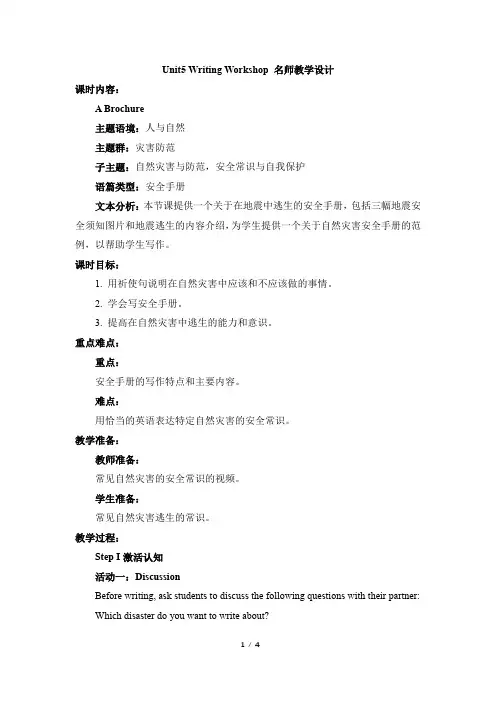
Unit5 Writing Workshop 名师教学设计课时内容:A Brochure主题语境:人与自然主题群:灾害防范子主题:自然灾害与防范,安全常识与自我保护语篇类型:安全手册文本分析:本节课提供一个关于在地震中逃生的安全手册,包括三幅地震安全须知图片和地震逃生的内容介绍,为学生提供一个关于自然灾害安全手册的范例,以帮助学生写作。
课时目标:1. 用祈使句说明在自然灾害中应该和不应该做的事情。
2. 学会写安全手册。
3. 提高在自然灾害中逃生的能力和意识。
重点难点:重点:安全手册的写作特点和主要内容。
难点:用恰当的英语表达特定自然灾害的安全常识。
教学准备:教师准备:常见自然灾害的安全常识的视频。
学生准备:常见自然灾害逃生的常识。
教学过程:Step I激活认知活动一:DiscussionBefore writing, ask students to discuss the following questions with their partner: Which disaster do you want to write about?What advice would you give on surviving it?【设计意图】通过Discussion活动,教师让学生从个人的经验和认知能力出发,以结对活动的方式选择要写的安全手册的主题和安全逃生建议,激发学生的写作兴趣。
Step Ⅱ 学习理解活动二:Read for writingRead the brochure about surviving an earthquake on Page 41.Then underline what you should do when you’re indoors, outdoors and in a car.活动三:Focus on structure and language1. Read the brochure again,Complete the table.2. Look at the Sentence Builder. Write a few sentences that you may want toinclude in your brochure about Dos and Don’ts for surviving a particular disaster.【设计意图】学生通过阅读地震逃生手册,从中获取内容、写作结构、语言特征,然后运用祈使句说明通到自然灾害时的注意事项,为本课写作奠定基础。
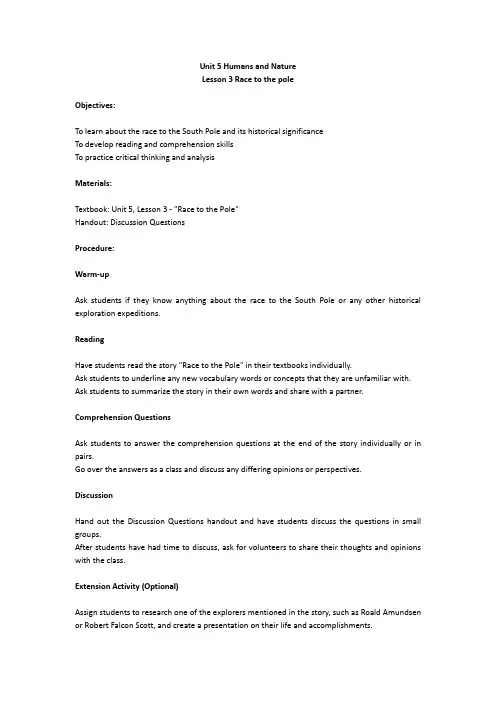
Unit 5 Humans and NatureLesson 3 Race to the poleObjectives:To learn about the race to the South Pole and its historical significanceTo develop reading and comprehension skillsTo practice critical thinking and analysisMaterials:Textbook: Unit 5, Lesson 3 - "Race to the Pole"Handout: Discussion QuestionsProcedure:Warm-upAsk students if they know anything about the race to the South Pole or any other historical exploration expeditions.ReadingHave students read the story "Race to the Pole" in their textbooks individually.Ask students to underline any new vocabulary words or concepts that they are unfamiliar with. Ask students to summarize the story in their own words and share with a partner.Comprehension QuestionsAsk students to answer the comprehension questions at the end of the story individually or in pairs.Go over the answers as a class and discuss any differing opinions or perspectives.DiscussionHand out the Discussion Questions handout and have students discuss the questions in small groups.After students have had time to discuss, ask for volunteers to share their thoughts and opinions with the class.Extension Activity (Optional)Assign students to research one of the explorers mentioned in the story, such as Roald Amundsen or Robert Falcon Scott, and create a presentation on their life and accomplishments.Assessment:Participation in discussion and comprehension questionsQuality of critical thinking and analysis in discussionDiscussion Questions:What qualities do you think are necessary for someone to become an explorer?In your opinion, was the race to the South Pole worth the risks involved? Why or why not?Do you think that exploration is still important in modern times? Why or why not?Were the explorers in the story more motivated by personal glory or by a desire to advance scientific knowledge? Explain your answer.What do you think are some of the potential dangers or challenges of exploration that are unique to the 21st century?Homework:Imagine you are a member of one of the teams in the race to the South Pole. Write a diary entry describing your experiences during the journey, including the challenges you faced and how you overcame them.。
Unit 5 Rhythm一、学习目标【单元话题】1. 熟悉了解主要英语国家的艺术形式。
2. 了解中外著名画家、艺术家、建筑师,以及不同的艺术、建筑风格。
【词汇】Lesson 1:effect, performance, base, award, anger, audience, disappoint, impress, extraordinary, extremely, creative, powerful, throughoutLesson 2:instrument, male, female, general, combine, in other wordsLesson 3:talent, key, beauty, appearance, quiet, worldwide, at times Lesson 4:generation, type, ordinary, unique, noble[来源:ZXXK]【交际用语】学习请求允许或拒绝的用语※Is it OK/all right if I…?Can/Could I…?Would it be all right if I did…?Please let me…No, I'm afraid you can't.【语法】1. will用于表示决定。
2. 学习时间、原因、结果、目的等状语从句。
二、单元知识要点Lesson 11. Read the concert review and match the four paragraphs with the titles.读这篇音乐会评论,把这四段和对应的标题连接起来。
Match…with…把……和搭配起来,也可用match…to…。
You should match your blouse to/ with your skirt. 你应该把上衣和裙子搭配起来。
match the article with/to the writermatch…with…还可表示:①使……与……对抗/搭配The teacher matched me with Tom in today's tennis match.老师要我在今天的网球比赛中跟汤姆比。
②使……与……结婚He matched his daughter with his friend’s son.2. Canadian singer and song writer, Alanis Morissette, is used to being in the public eye.加拿大歌唱家阿兰妮丝·莫里塞特已经习惯了公众的关注。
be/get used to(doing)sth. 习惯于(做)……,为固定短语。
be used to do sth. 被用来做……,是被动语态。
used to(do sth.)过去常常……,是情态动词。
He used to get up late but he is/gets used to getting up early now. 他过去常常起得很晚,但现在他习惯早起了。
Wood can be used to build houses. 木头可用来建房子。
3. come out①出版、刊出、发行His first novel will come out next month.他的第一部小说将在下个月出版。
②(花)开,绽放Roses will come out soon. 玫瑰不久就会开放。
③(秘密等)泄露The secret has come out at last.④(结果)变得……Everything came out all right in the end.结果一切都变得顺利。
4. She has continued giving great performances on stage.她继续举行精彩的个人演唱会。
continue后可接to do或doing sth.作宾语,用法相同。
She continued crying/to cry. 她继续哭着。
continue(to be)……依然,仍旧,后接形容词。
She continued(to be)poor until she died. 她到死时依然贫困。
The weather continued(to be)fine. 天气一直很晴朗。
5. I hope we'll warm it up in here for you.我希望我们的演唱能把温暖带给大家。
warm upvt. 使……热,使暖和He made a fire to warm them up. 他生起火来让他们暖和些。
vi. ①(比赛前)做热身运动②变暖和③发生感情[来源:学。
科。
网Z。
X。
X。
K]You must warm up before you play football.在踢足球之前你必须要做热身。
They began to warm up after they went into the room.6. Her singing was full of feeling, the first part of the song was filled with anger,…她的歌唱充满了感情,这首歌曲的第一部分充满了愤怒,…be full of与be filled with均有“充满”之意,但前者是形容词短语,后者是动词短语,为fill…with…的被动结构;一般两短语可以互换。
His pockets were full of money.他口袋里装满了钱。
His pockets were filled with money.7. long-time fans长期的歌迷long-time是“形容词+名词”构成的合成形容词,又如:second-hand二手的high-class高级的常见的合成形容词构成方法还有:①数词+名词(单数):one-child独生子的two-hour两小时的②数词+名词(单数)+形容词:three-year-old 三岁的six-meter-tall 六米高的③形容词+名词-ed:cold-blooded冷血的good-tempered 脾气好的④形容词/副词+分词:ever-lasting 永恒的well-dressed穿着好的⑤名词+分词:life-saving 救生的state-owned国有的⑥名词+形容词:world-famous 世界闻名的tax-free免税的Lesson 21. such as与for examplesuch as为短语介词用法,表列举与上文所说事物有相似点的事物,意“象…那样的”,后直接加名词、代词,不与and so on连用。
如:Children such as these make people cheerful.象这样的孩子们会使人们欢喜。
I visited several European countries, such as France, Italy and Germany.for example“例如”,用来举例子,可以放在所举例子的前面,也可放在所举例子的后面,常用逗号隔开。
We visited several European countries, for example, France, Italy and Germany.(也可说成……France, Italy and Germany, for example.)此外,for example还可用来引出一句话或一件事来举例说明上文内容,如:Tom is a kind person. For example, he often offers money to poor people.2. Well, symbols play a very important role in Beijing Opera.一些动作在京剧中起着非常重要的作用。
play a…role 起……作用、扮演……角色,相当于play a…part。
He played an important role in the talk.[来源:学.科.网Z.X.X.K]他在那次会谈中起了重要作用。
She played the leading role in the movie.她在那电影中扮演主角。
3. 请求允可,做出许可或拒绝用语。
Is it ok(all right)if I go? 我可以走了吗?Can/Could I do…?我可以……吗?Would it be all right if I did…?Shall I do…?Please let me do…Yes, you can…All right. I'll let you do…Sure. /Certainly, you can./Of course./ Go ahead.No, I'm afraid you can't.Lesson 31. Kong goes for folk! 孔喜欢民歌。
go for①喜欢=be fond of, like, enjoyI don't go for Beijing Opera. 我不喜欢京剧。
[来源:学。
科。
网Z。
X。
X。
K]②去做Let's go for a walk. 我们去散步吧!③去取(请,叫)Ask him to go for the doctor. 让他去请医生来。
④努力想获得go for the championship 努力想获取冠军⑤适用于What I said about Peter goes for you, too.我说的关于彼特的话也适用于你。
2. …surprised his fans last week by giving a concert combining classical music with Chinese folk music.……通过举办了一场把古典音乐与中国民间音乐相结合的音乐会,让他的歌迷感到新奇。
①by giving…介词by短语作方式状语。
The old man made a living by selling vegetables.②combine…with…把……和……结合起来(混合)combine theory with practice 理论结合实际She combines wit and beauty. 她才貌双全。
combine hydrogen with oxygen 使氢与氧混合(同mix…with…)3. His mother couldn't buy him a piano until he was seven.他妈妈直到他七岁时才给他买了一架钢琴。